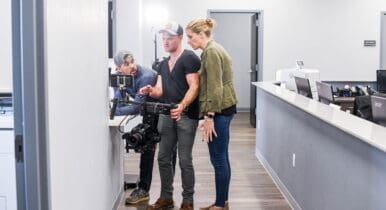A Shift Away From Hyper Specialization for Firms?

Across the country, so-called combination businesses have been on the rise. Think bike shops that sell coffee, or a whiskey bar that sells plants.
In the consulting industry, multidisciplinary firms have been a thing for years. But now, startups that would normally have launched with a single speciality are hedging their bets on a pair of complementary services.
In June, Alyssa Batchelor publicly launched Hill and State Strategies, which offers both organizational training and opposition research services — a combination that was born out of post-pandemic uncertainty among some organizations on the left.
“After Covid, I was working with a lot of different progressive groups and organizations, and one of the things that I noticed was that they were having an issue figuring out what’s next for their organizations?” Batchelor told C&E.
“Do they develop a [501c4] and create a slate? How do they develop their leadership? How do they figure out what’s next? And so when I was kind of toying around with the offerings that Hill and State was going to have, I really wanted to make sure that we were coming to market with something that was innovative, something that was new, and something that hasn’t been done before.
“And also something that could actually help organizations with where they are and what’s next.”
Batchelor believes that the industry is moving away from firm specialization — a theory that’s backed up by moves other practitioners have made. For instance, Democratic fundraiser Andrea Ramunno last year launched a combo firm that also provides a training offering for clients’ staff.
“The industry is moving away from this idea that you hire a consulting firm particularly to do one type of thing,” Batchelor added. “In my conversations with candidates and organizations, they’re really looking to leverage a firm that has strategic expertise in a lot of different areas when it comes to campaigns and having the ability to use the research on the operations side … to strategize with the campaigns themselves on how to actually deploy that.”
The combination business can also help a solo-entrepreneur weather a slow period for one of their offerings.
“Opposition research is a tough vertical to go into,” said Batchelor, who served as director of political research at The Mellman Group. “A lot of democratic organizations are trying to leverage research themselves, but there is just simply too much information out there for Democratic campaigns and research staff to organize themselves. It goes beyond media.”
Still, she sees the demand for research growing in the coming years. “I think it’ll become increasingly necessary in the next couple of election cycles to actually do good research. We’ve seen what happens when there’s opposition research that isn’t done on certain candidates.”
While having research as the foundation of her practice “it makes sense to have at least a few offerings.”
When it comes to the training offering, a model client for Batchelor is a progressive organization that’s changing gears.
“Maybe they were doing some sort of type of training in the past, but now they want to influence elections in some way. That would be a place where we could say, ‘okay, we can develop this program for you,'” she said.
For instance, if the group wanted to develop a slate in, say, Virginia’s off-year elections “we can go and then do that research, walk them through the process to help them develop [some] kind of endorsement processes,” she said. “Help them put together that slate and develop both internally their system for doing that on their own in the future, but also help do the research component to that as well.”

